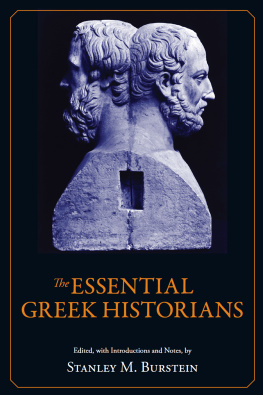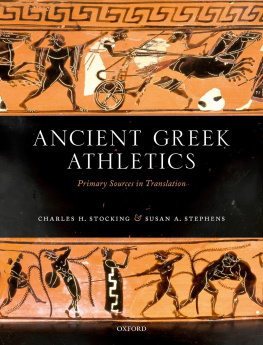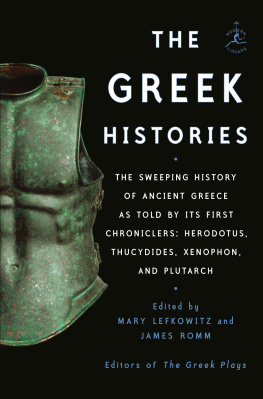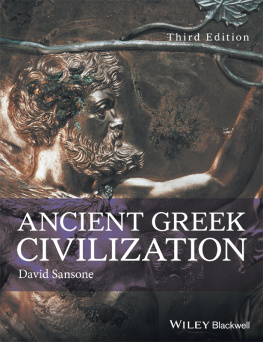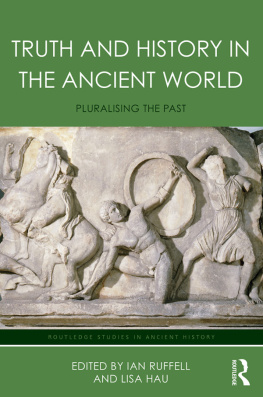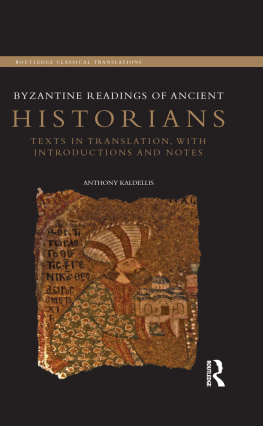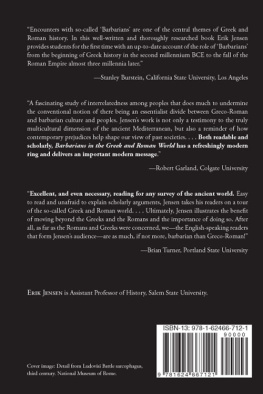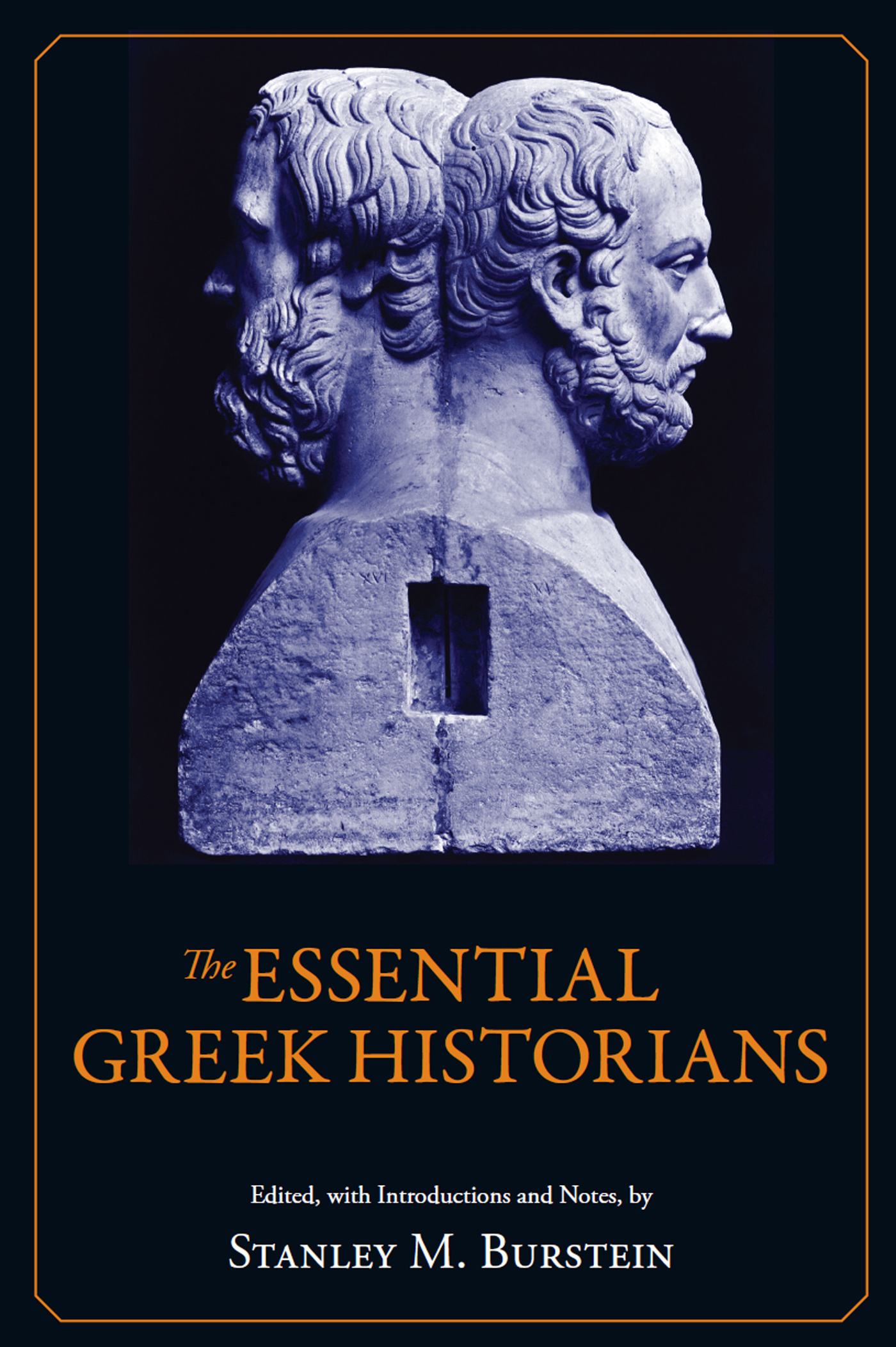Contents
The Essential
Greek Historians
The Essential
Greek Historians
Edited, with Introductions and Notes, by
Stanley M. Burstein
Hackett Publishing Company, Inc.
Indianapolis/Cambridge
Copyright 2022 by Hackett Publishing Company, Inc.
All rights reserved
Printed in the United States of America
25 24 23 22 1 2 3 4 5 6 7
For further information, please address
Hackett Publishing Company, Inc.
P.O. Box 44937
Indianapolis, Indiana 46244-0937
www.hackettpublishing.com
Cover and interior design by E. L. Wilson
Composition by Aptara, Inc.
Library of Congress Control Number: 2021944430
ISBN-13: 978-1-64792-040-1 (pbk.)
ISBN-13: 978-1-64792-050-0 (cloth)
ISBN-13: 978-1-64792-051-7 (PDF ebook)
Epub3 ISBN: 978-1-64792-073-9
Herodotus, On the War for Greek Freedom: Selections from The Histories . Translated by Samuel Shirley. Edited, with Introduction and Annotation, by James Romm.
Herodotus, Histories . Translated by Pamela Mensch. Edited, with Introduction and Notes, by James Romm.
Thucydides, The Peloponnesian War . Translated, with Introduction and Notes, by Steven Lattimore.
Thucydides, The Essential Thucydides: On Justice, Power, and Human Nature . Translated, with Introduction and Notes, by Paul Woodruff.
Plutarch, Lives That Made Greek History . Edited, with Introductions and Notes, by James Romm.Translated by Pamela Mensch.
Alexander the Great: Selections from Arrian, Diodorus, Plutarch, and Quintus Curtius . Edited, with Introduction, by James Romm.Translated by Pamela Mensch and James Romm.
Ancient Rome: An Anthology of Sources . Edited and Translated, with an Introduction, by Christopher Francese and R. Scott Smith.
Contents
{viii} To the memory of
Dr. Mortimer H. Chambers Jr. (19272020)
Distinguished scholar, teacher, mentor, colleague, and friend
{ix}
Greek historians frequently complain that most of ancient Greek literature has been lost. So, for example, of the almost 1,000 Greek writers who wrote histories, the works of less than a dozen have been preserved, and not all of those completely. As the familiar clich goes, however, a glass can be viewed as half empty or half full, and in the case of Greek historical literature, the glass is definitely half full. The works that have been preserved include those of some of the most distinguished prose authors in Greek literature and some of the most interesting narrative literature to survive from antiquity. For over half a century, the most popular introduction to Greek historiography for students has been M. I. Finleys The Portable Greek Historians .
The Portable Greek Historians has served students well, but its weaknesses have become more and more apparent with time. Three are particularly noteworthy. First, although no anthology can be truly comprehensive, Finley did not provide students with a true picture of the range and variety of Greek historiography by limiting his selections to the works of only four authors. Second, the translations he used were archaicthe latest was published in 1889and are increasingly difficult to read by contemporary students. Third, and finally, the supporting materialintroduction, notes, and bibliographywere all limited. The present anthology aims to remedy these flaws and to provide contemporary students with an introduction to the riches of ancient Greek historiography that will serve them as well as The Portable Greek Historians did. To that end, more readable translations have been used and provided with the necessary supporting materials, including contextual summaries and footnotes and a list of suggested readings.
Every author acquires debts to other scholars in the course of research and writing, and I would like to take this opportunity to acknowledge mine. First, and foremost, is to a great historian and teacher, Professor Mortimer H. Chambers Jr. of UCLA, who kindly agreed to review and revise Sir Frederick G. Kenyons translation of Aristotles The Constitution of Athens . I would also like to express my gratitude to Dr. Andrew Smith, who generously granted permission to reprint selections from his excellent translation of Memnons History of Heracleia Pontica . Thanks also are due to Professors Frank Holt of the University of Houston, Jennifer T. Roberts of the City University of New York, and Raimund Schulz of the University of Bielefeld, who read and commented on earlier drafts of the Introduction. Finally, I particularly would like to thank Rick Todhunter of Hackett Publishing Company, who suggested this project and has supported it throughout.
{x}
There have been literally dozens of English translations of the major Greek historians since the Renaissance, some of which, for example, the philosopher Thomas Hobbess translation of Thucydidess History of the Peloponnesian War , are themselves literary classics. At the same time, the archaic language of even the best of the many available translations makes them increasingly difficult for contemporary students to read and appreciate. For that reason, the translations used in this book, which are listed below, have been selected for both their accuracy and their readability:
Aristotle, The Athenian Constitution , trans. by Sir Frederick Kenyon (London: G. Bell, 1914) with corrections and revisions by Mortimer H. Chambers.
Herodotus, On the War for Greek Freedom: Selections from the Histories , trans. by Samuel Shirley with Introduction and Notes by James Romm (Indianapolis: Hackett Publishing Company, 2003).
Memnon, History of Heracleia , trans. by Andrew Smith (Attalus.org [www.attalus.org/info/memnon.html]).
Plutarch, Lives That Made Greek History , trans. by Pamela Mensch with Introductions and Notes by James Romm (Indianapolis: Hackett Publishing Company, 2012).
Polybius, The Histories , trans. by W. R. Paton, 6 vols. (Cambridge, MA: Harvard University Press, 19221927).
Thucydides, On Justice, Power, and Human Nature , trans. by Paul Woodruff (Indianapolis: Hackett Publishing Company, 1993).
Xenophon, Hellenica , trans. by Carleton L. Brownson, 2 vols. (Cambridge, MA: Harvard University Press, 19181921).
The Parian Marble has been translated specially for this volume by the editor, Stanley M. Burstein. Unless otherwise noted, he has also created anew all introductions and notes.
For consistencys sake, the spelling of some terms and names in the translations of Xenophon (Chapter 3), Aristotle (Chapter 4), Polybius (Chapter 6), and Memnon (Chapter 7) have been Americanized.
{xv}
Historians working in the second half of the nineteenth century CE considered the founding of the Olympic Games in 776 BCE the earliest verifiable event in Greek history. To these scholars, the history of Greeceand its Egyptian and Near Eastern neighborsbefore that date was largely a blank. Now the situation is dramatically different. Textbooks of ancient history routinely begin their narrative histories of Greece (and Egypt and Mesopotamia) thousands of years earlier. Modern historians are able to do this thanks to two triumphs of modern scholarship: the decipherment of the written records of ancient Egypt and Mesopotamia and archaeologists discovery and excavation of many of the principal sites of these ancient civilizations.

